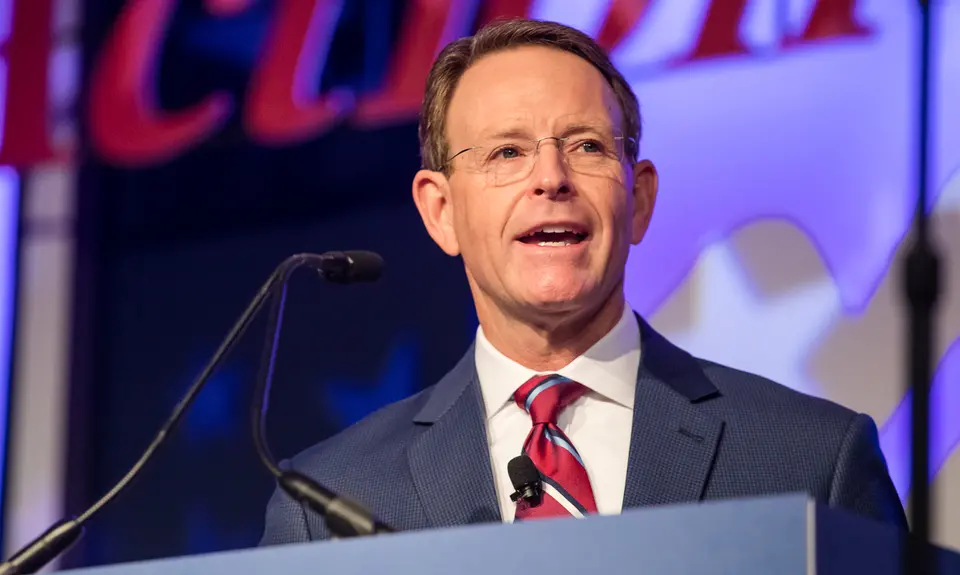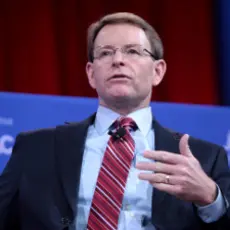Religious-right activist Tony Perkins portrayed calls to increase mail-in voting during the COVID-19 pandemic as a sinister Democratic plot in a blog post Tuesday, claiming that 28 million mail-in ballots have gone missing since 2012.
With the novel coronavirus making it hard to count on voters being able to safely go to the polls in person in November, voting rights activists have called for an increase in voting protections, including an expansion of early voting and universal mail-in options. Democrats are seeking billions of dollars to implement vote-by-mail systems in every state in an effort to ensure the integrity of the election and avoid another wave of infections, but Republicans have bristled at such measures, claiming they are ripe for fraud.
“When a federal elections commission started asking questions, not one person had any explanation for the 28.3 million mail-in ballots that have gone missing since 2012,” Perkins claimed in the post that was republished Thursday in the Daily Signal, the publication arm of the right-wing Heritage Foundation. “As far as they're concerned, one in five absentee votes just vanished. No one knows if it's fraud, system failure, general ineptitude, or a combination of all three. What we do know is that Democrats want us to trust this same process -- on a national scale -- this November. Thank you, but no thank you.”
That 28 million number Perkins cited originates from the Public Interest Legal Foundation, a right-wing activist group whose president J. Christian Adams is well known for advocating voter suppression measures, including threatening states and counties with lawsuits if they do not purge their voter rolls. In 2013, The Atlantic’s Andrew Cohen described Adams as “a longtime conservative critic of many facets of the Voting Rights Act, whose claim to fame as a federal lawyer seems to be his penchant for accusing black people of discriminating against whites.”
Contrary to Perkins’ claim that no one knows what happened to those ballots that PILF claimed were “missing,” the Washington Monthly reported that the organization included those in which they knew just what happened. PILF itself notes that some ballots never arrived at their intended addresses, which could be due to outdated addresses; some were never returned, including those who simply decided not to vote; and others were rejected, often as a result of signature match errors. PILF's inclusion of ballots from the last category, the Washington Monthly notes, is ironic, because checking signatures against voter registration rolls is an election security measure for voting by mail. And while Adams suggests that his group's report shows there were 28 million opportunities for fraud, even Mark Hemingway, a writer Perkins cites, notes that “there is no evidence that the millions of missing ballots were used fraudulently.”
Even by the Heritage Foundation’s own numbers, over the past 20 years, there have been only 143 criminal convictions of fraud with mailed ballots. And that’s out of the roughly 250 million votes that have been cast by mail nationally over the same time period.
While Perkins, who leads the religious-right Family Research Council, attempted to capitalize on fears of voter fraud, he accused Democrats of fear-mongering.
“With Democrats trying to use the coronavirus to push America toward its endgame of universal mail-in ballots, voters need to wake up to the gamble they'd be taking with democracy. Already, two liberal senators, Amy Klobuchar (Minn.) and Ron Wyden (Ore.), are trying to capitalize on people's fears with what they call the Natural Disaster and Emergency Ballot Act of 2020,” Perkins warned, referring to legislation that would expand early in-person voting and no-excuse absentee vote-by-mail to all states. “But frankly, Americans ought to be more afraid of the chance they'd be taking with their vote.”
In the accompanying radio interview he conducted with Sen. Roy Blunt of Missouri, Perkins suggested it was wrong to send ballots to everyone and that seniors were at risk of having their votes stolen from them.
“We’re talking about not those that request a ballot because they can’t get to the polls because they’re sick or they want to be protective of any kind of health risk, these are ones that are being sent out in the mail to everybody, which is being proposed,” Perkins said, as if the highly contagious coronavirus that has spurred stay-at-home orders in nearly all 50 states could not be considered a health risk. “And as you pointed out, this is where the ballot harvesting comes in. And it makes particularly the elderly and others targets for those that would prey upon them and deprive them of their vote.”
The practice of organized workers picking up early voting or mail-in ballots and delivering them to polling officials, which Perkins referred to as “ballot harvesting,” helps people who have limited access to voting sites vote.
As Right Wing Watch’s report on the right-wing war on voters detailed, since the 2008 election, Republicans and right-wing groups have pushed voter-suppression measures in earnest where they can and fought against anything that could make it easier for Americans to vote, fearing it would hurt conservatives’ prospects. Trump said as much earlier this month about mail-in voting.
"You'd never have a Republican elected in this country again," Trump said. “Mail-in voting is a terrible thing,” he added a few days later, even though he had recently voted by mail.
Update: ProPublica found that the Public Interest Legal Foundation had doubled official government numbers with its claim that more than 1 million ballots sent out to voters in 2018 were returned as undeliverable. PILF eventually corrected that figure, but it continued to defend the report’s conclusions even as experts called the report misleading.







